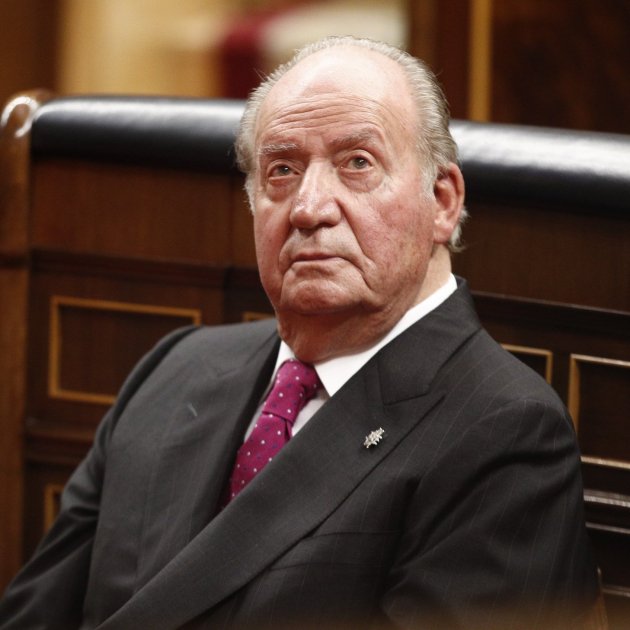Monday, August 3rd. Madrid. The Spanish royal house publishes a letter from the country's king emeritus Juan Carlos I, informing his son, current monarch Felipe VI, that he is leaving Spain with no date set for his return due to certain past events in his private life. Which is a euphemism for saying that the retired monarch is moving away from Spain to preserve his son's legacy and in this way separate him from the investigations and corruption cases that are hanging over his father.
The flight of the king emeritus culminates the manoeuvre carried out by the royal palace that had begun with Felipe VI's renouncement of his share of his father's inheritance after information had been revealed from Switzerland on the dirty laundry of his business dealings with Saudi Arabia. It can also be seen as a second attempt to save the institution, following Juan Carlos I's abdication in June 2014.
Act of abdication of Juan Carlos I, in 2014 / GTRES
What the letter does not say is where the emeritus is bound and, in four days, that has been a topic of great speculation, but there are two main theories that have gained strength. The first states that Juan Carlos I is in the Dominican Republic staying at the house of a friend, Pepe Fanjul. In favour of this theory is that the Caribbean country has no extradition pact with Switzerland, where Juan Carlos is also being investigated, and also that it was the view supported in two of Spain's most monarchical newspapers - ABC and La Vanguardia - although, as of Thursday morning, they were also admitting they didn't know for sure where Spain's former head of state was to be found.
The second theory, which has sounded a little less convincing so far, is that the emeritus is in Estoril, the Portuguese town where he spent much of his childhood after his father, Juan de Borbón, went into exile there with the proclamation of the Second Spanish Republic in 1931.
However, it seems that neither theory fully stands up and the more time that passes without confirmation from the royal palace, the more intrigue and anxiety are generated on the whereabouts of the 82-year-old exiled king who is being investigated by prosecutors in the Spanish Supreme Court as well as by their counterparts in Switzerland. It is also noteworthy that despite not saying where the emeritus is, his lawyer, Javier Sánchez-Junco, assures that Juan Carlos I is fully at the disposal of public prosecutors, although in truth it is slightly difficult to get in contact with someone when you don't know where they are.
A government close to rupture?
The exile of Juan Carlos I has also unleashed a political earthquake which could even create a rupture in the Spanish government, due to the major tensions it has caused between the two partners in Spain's minority coalition government, the Socialists (PSOE) and Podemos. On the one side, the PSOE has defended the departure of the king emeritus at every possible opportunity; on the other, Podemos has harshly criticized the former Bourbon king, even calling for justice to prevent him from leaving the country.
One of the key PSOE voices in the Spanish executive, deputy PM Carmen Calvo, has stood up for the emeritus, arguing that his journey out of Spain is not "flight" as he has not run away from anything: "He is not immersed in any judicial cause," she says. Calvo also argued that Sanchez's cabinet had nothing to do with the exile of Juan Carlos I and that they knew about the letter "at the same time as everyone else."
On the part of junior government partner Podemos, equality minister Irene Montero asserted that her party had no idea of the intentions of the king emeritus, and strongly reprimanded the attitude of the Socialists - "this is not a decision that has been taken in the coalition government", she said, but rather the "PSOE from the prime minister's residence" . In an interview with radio network SER, she described the flight from Spain "disgraceful".
Spokesperson for Podemos in Congress, Pablo Echenique, made a call for Juan Carlos's departure from Spain to be stopped, arguing that the move away from Spain is evidence of a will to hinder the Supreme Court's investigation into the matter. In the same vein, the Unidas Podemos group in Congress issued a statement calling for an end to the blocking of "social debate on the model of the Spanish state" and clearly advocating that Spain set out on the road to a republic by abolishing the monarchy.
A prime minister who knows nothing
As for Spanish PM Pedro Sánchez, he limited himself to some general comments in praise of the monarchy and the status quo, speaking at last Tuesday's scheduled press conference called to review the government's performance up till now. The prime minister made no comments at all on Juan Carlos I in his main discourse.
It was not until the turn of questions, and thanks to journalists, that he even mentioned the matter, although he offered no details. Moreover, he claimed that conversations between between the head of state, Felipe VI, and himself are confidential, which set off alarm bells about a possible pact between government and monarchy for the flight of the emeritus.
And he had no answer to the question of where the king emeritus actually is now. For the prime minister, Juan Carlos is in parts unknown.
